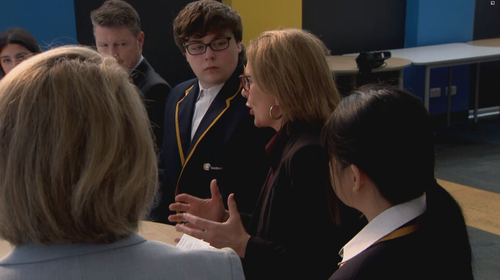Share this @internewscast.com
Social workers are set to assist students who are at risk by enhancing their relationship skills, fostering a sense of belonging, and improving their school attendance.

“Data indicates that disengaging from school often signals underlying issues,” Allan explained, “and for some children, it can be the first step towards criminal behavior.”
Their focus will not include handling the most serious young offenders, such as those already facing legal proceedings.
This initiative is inspired by a successful approach in Glasgow, where the creation of a violence reduction unit led to a 60 percent drop in violent crime.
“This is a proven strategy that delivers results,” Carroll noted.
“We understand that apart from the family environment, schools serve as the most crucial protective factor for young people, especially those who are vulnerable,” he added.
“Early intervention officers have been proven to halve absenteeism and also in nine out of 10 young kids at risk, show them the power of education and live a life of purpose.”
About 70 per cent of Victoria’s worst youth offenders were “chronically absent” from school before they turned to a life of crime, new data from Victoria’s Council on Bail, Rehabilitation and Accountability (COBRA) reveals.
The data set analysed a targeted group of 70 children aged 12-17 who had engaged in the worst crimes, such as aggravated home invasions.
“The data is telling us that schools are an incredibly important place and provide an incredibly important opportunity for us to better support young people,” Allan said.
The government has not revealed which schools will benefit from early intervention officers, but said Melbourne’s west would be a focus.
“We’ll be working through the data to guide the decision-making around those 20 schools because this is a targeted initiative,” Allan said.
“We want to make sure that the targeting of this program is where it’s needed most.”











